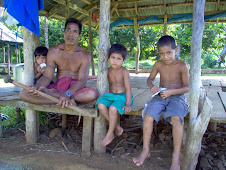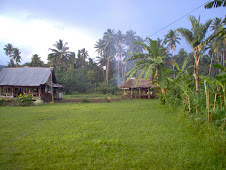As on most Pacific Islands, there are very few native animals in Samoa. Because they were isolated and without human inhabitants until very recently historically, all life that evolved here came in one of three ways: wing, water, and wind. So birds are the most common and diverse animals. Sadly, many native birds on the Pacific islands have become extinct. Western ships brought with them mosquitoes (with avian malaria), and other animals, that have devastated the bird populations. Nonetheless, there are a lot of birds here, native and non-native. I especially enjoy watching the water birds, swooping low over the ocean, looking for a meal.
There and mice and rats, nearly ubiquitous throughout the world. There are still a few islands in the Pacific without them. They came with the first ships and have been one of the main threats to birds. I haven’t seen any in our house in Poutasi, but I see them occasionally in other houses, and even in the Peace Corps office. Most people have outdoor cats to control the mice and rats. There aren’t any other small animals – no squirrels, chipmunks, possums, rabbits, skunks, foxes, etc. No snakes either.
There are newts and geckos which are small, only a few inches long. The geckos come and go inside the houses and are appreciated since they eat the mosquitoes and other insects. They’re actually pretty darn cute walking up the wall on their sticky little feet. Speaking of other insects, there are flies, of course, and spiders, some quite large. The largest spider I’ve seen was about five inches across from leg tip to leg tip (do spiders have feet?). There are also lots of millipedes, an inch or so long with lots of tiny legs. They won’t hurt you, but they come out at night and it’s kind of gross to squish one with your bare foot in the dark when you’re on your way to visit the facilities. There are large centipedes which are five or six inches long and have a nasty bite that swells up. Fortunately, I’ve never been bitten, but a lot of Peace Corps volunteers have. There are some pretty good sized cockroaches (maybe two inches long), but they are easily controlled with some insect spray, especially in a western-style house like I live in. And there are small ants always and everywhere.
The only native mammal is the fruit bat. The Polynesians, who came here in canoes 3,000 years ago, brought with them chickens, dogs, and pigs. Chickens roam freely, but they go home to roost at night in the trees at the family compound. Families feed them rice or shredded coconut – not much, just enough so they know where home is. The chickens are very pretty. The roosters are usually multi-colored with iridescent blue-green and brown and gold feathers. I saw one chicken in the village that was white with black spots, just like a Dalmatian. The little chicks are delightful to watch as the follow their mother around the yard learning to scratch for food.
Some pigs are fenced in, but others roam, rooting around for food, and like the chickens, know where home is. They’re fed fruit like papayas or green bananas, and leftover vegetable matter (peels, squash rinds, etc.) The pigs that aren’t fenced in are really quite a nuisance and gardens must be fenced to keep the pigs out. There are also wild pigs. Some families have cattle – maybe a small herd or maybe just one (cows aren’t milked). Both pigs and cattle are like currency and the number of pigs and cattle that you have are a sign of wealth. Fines are levied in the village for breaking village rules and payment is often a pig to the chiefs. At ceremonial occasions, such as weddings, funerals, or any special event, roast pigs are brought to present to the honored guests. The larger the pig, the larger the honor bestowed. And if a cow is butchered and given to the honored guests, it is deemed to be a special tribute.
Horses are used to get to and from the farmlands just outside the village, and to carry produce, or otherwise as beasts of burden. They are ridden with many strands of grasses about four feet long bunched together and laid over their backs with a small blanket on top of the grass. Looks very comfy; they aren’t going anywhere in a hurry. There are a few sheep here, but they are new in the country and are on experimental farms.
The only other animals are the dogs. There are a lot of them and they are mostly pests, not pets. There are occasionally dogs that remind you of a recognized dog breed somewhere in their distant lineage, but most are a standard mutt, usually light brown with occasionally some black or white coloring, short hair, with a slender build, and some are dreadfully skinny. Surplus dogs fend for themselves and roam around in packs. Many Peace Corps volunteers have been bitten by dogs (not me, knock on wood). Although I’ve had a moment or two of worry while I stood my ground and shouted, while pretending to pick up a rock and throw it at them. There weren’t any rocks nearby, or I would have actually done it. Nearly every family has three or four watch dogs who are profoundly territorial. At night there are a lot of dog fights. Almost every dog has some remnant of an injury – a lame leg, a torn ear. The female dogs are always pregnant or nursing. I don’t know what they do with the surplus puppies, and I don’t want to know. With few exceptions, dogs aren’t neutered and are abused. They are routinely kicked if they’re in the wrong place at the wrong time. They are never petted. One of our dogs died last week, apparently of poisoning. Not intentional probably. He likely got into some insecticide or something. It was awful to see him suffer for hours and then die. Of course in the states, he would have been rushed to the vet, but there was no vehicle that day to take him to Apia, and they wouldn’t have anyway. So it was just, “He’s dying.” And so he did.
There’s a new puppy now, cute as a button, and about the size of a fat cat. I already hear him yelping occasionally from the lesson of the swift kick when he wants to come into the house. It’s hard to get accustomed to that. I told the family here that my dog in America stays in the house and sleeps on my bed, and they literally just looked at me and didn’t say a thing. I think it was simply incomprehensible.
Wednesday, February 13, 2008
Subscribe to:
Comments (Atom)


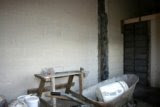

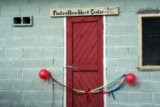
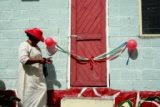
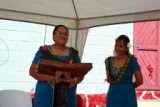
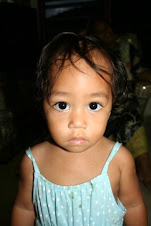




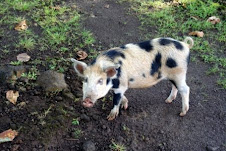

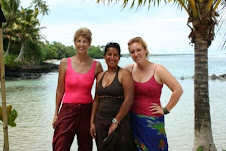

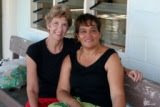

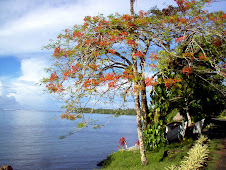
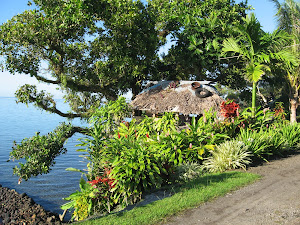
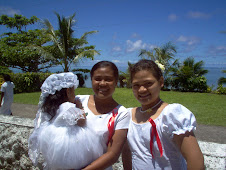
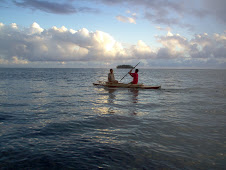

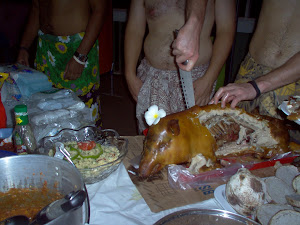
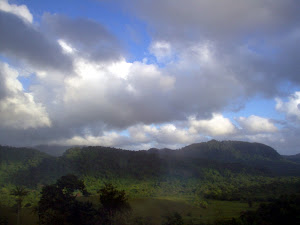
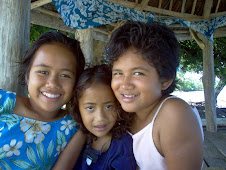.jpg)
